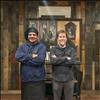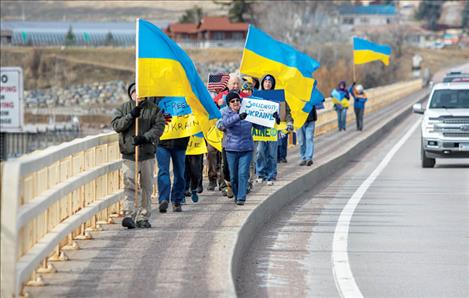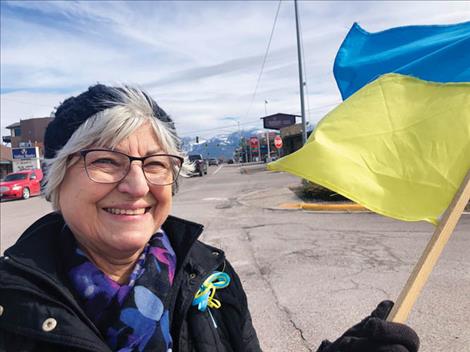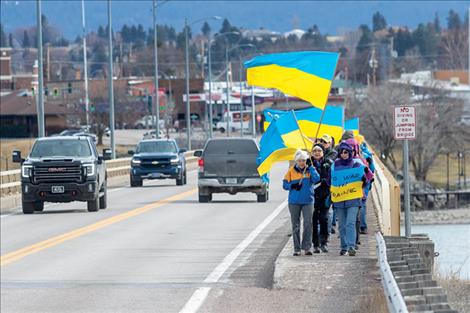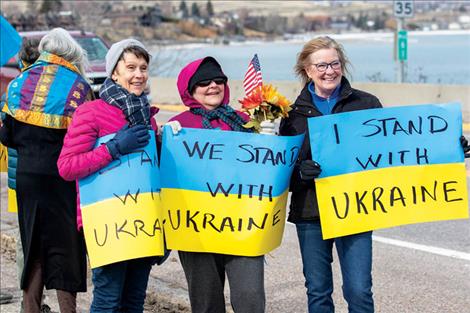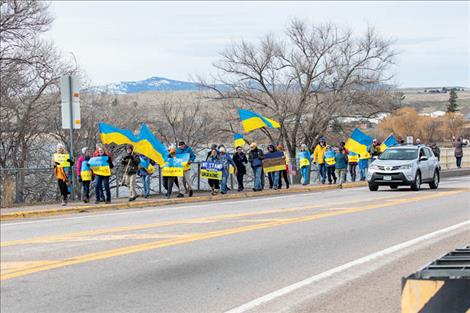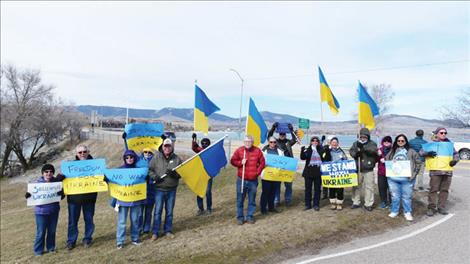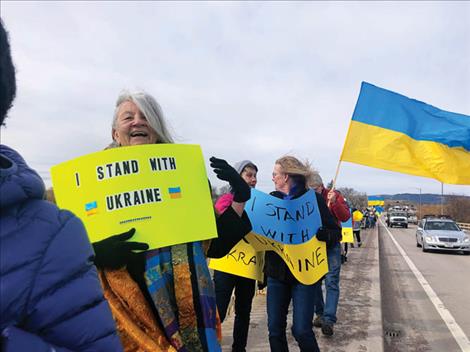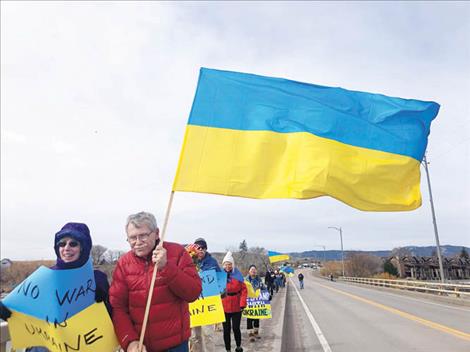Citizens march in show of support for Ukraine
Hey savvy news reader! Thanks for choosing local.
You are now reading
1 of 3 free articles.
POLSON — More than 30 people, bundled up and bearing blue and yellow flags, banners and sunflower bouquets, braved the cold last Monday to walk back and forth across the Polson bridge in support of Ukraine.
The march was organized by Lake County Democrats and billed as a non-partisan event. “As Montanans, we all share a love for freedom and democracy,” sponsors said. “Let’s show our support and encourage leaders to give the Ukrainians the support that they need to defend their country.”
One woman had yellow and blue bandanas tied to each arm, another had a tiny Ukrainian flat laced into her shoe, while a man, wearing shorts, crossed the bridge in his wheelchair. Protestors waved signs reading “Montanans Stand with Ukraine,” “Freedom and Peace for Ukraine,” “Stop Putin, Stop War.” Passing vehicles offered a chorus of encouragement, with honking horns and thumbs up.
For at least one participant, the walk was deeply personal. When Russia invaded the independent nation of Ukraine Feb. 24, it stirred a wasp nest of memories for Elisabeth Mollica, a resident of Wood’s Bay and a refugee of Soviet-era oppression.
Mollica’s grandparents are buried just a few miles from Ukraine’s border with Hungary, near the quaint and previously peaceful village of Uzhhorod, on the river Uzh. Her family of four children and parents, plus a grandmother and aunts and uncles, were expelled from Hungary in 1945 when she was five years old. By the time she was six, they were in their third refugee camp.
“Whenever the trains stopped and told people to get off, that’s where we had to get off.” Their first stop was Czechoslovakia, then Bavaria, and finally, the American-controlled sector of West Germany.
“We were all sick,” she recalls. “I had rickets, like so many children, from malnutrition.”
Yet, “all of us survived, and we still feel to this day an incredible sense of gratitude,” she says. “So many people did not survive – so many families were split, and so many men, especially, wound up in Siberia.”
The family was fleeing from the Soviets in the east and the bombings that enveloped Hungary – an ally of Germany during the war. “I always clarify I don’t like bombings, but the bombings in World War II were the only way to stop a maniac.”
She considers Vladimir Putin, the Russian leader who authorized the invasion of Ukraine, akin to Hitler and Stalin. “The bombings of Ukraine, in my opinion, are totally evil,” she adds. “To stop evil we have to call it what it is.”
As scenes and stories of fleeing Ukrainians and the devastation of their nation unfold, Mollica remembers her own flight as a child from similar aggression. She also recalls her trip to Ukraine in 2007 to visit her grandparents’ graves.
The towns, she says, are beautiful, drenched in history and culture, and the people, warm and friendly. “I want them to survive and I want the culture to survive. They’ve tried so, so hard to build a democracy and help themselves.”
Ukraine, one of the largest countries in Europe, has long been a source of grain for neighboring Russia, which treated its people like serfs, according to Mollica. After a citizen revolt in 2014 ousted corrupt president Viktor Yanukovych, the fledgling democracy’s future was in peril. Ukraine’s efforts to align itself with NATO and the European Union only inflamed tensions with their eastern neighbor.
Mollica – like people around the world – is inspired by the Ukrainians’ commitment to freedom and the courage of their leader, former comedian and actor Volodymyr Zelensky, elected in 2019. While she’s not in favor of direct military confrontation with Russia, she wholeheartedly supports U.S. and European efforts to help the beleaguered nation rebuff this brutal invasion.
She wishes she could go to Poland and join Chef Jose Andres, whose World Kitchen Central crew has established meal sites at eight border crossings in Poland, and in Romania.
“I love to cook! But since it’s not possible right now, I’ll do other things…” Like pace across a bridge in Montana, bearing a blue and yellow flag and remembering the devastation of another war, 75 years ago.
“I think we need to let the people decide what they want, where they want to be and how they want to protect their history,” she says. “And not do anything for the love of power, but for the power of love.”
As of last Friday, the United Nations refugee agency said more than 2.5 million people – mostly women and children – have fled Ukraine since the war began, with the majority landing in Poland. A host of international relief organizations are pitching in, including UNICEF, Doctors Without Borders, International Medical Corps, International Rescue Committee, Ukrainian Red Cross, CARE and Save the Children. Right now, sending money to a legitimate aid group is considered the most effective way to lend a hand.














